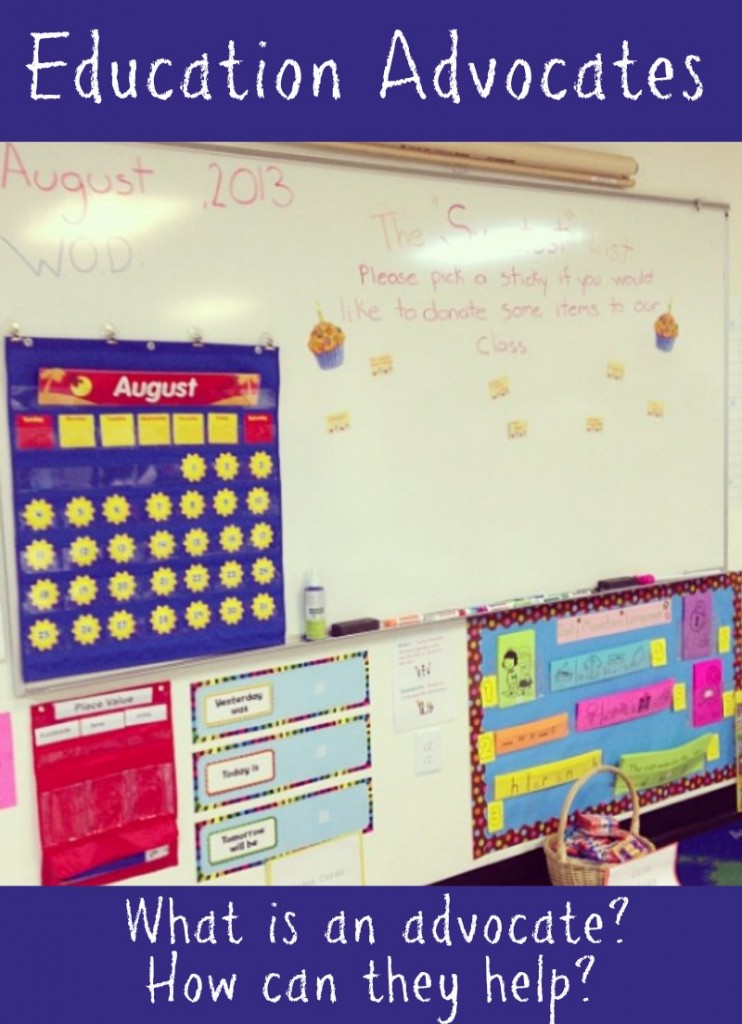We’re continuing back-to-school week with some important information of education advocates! I didn’t discuss it much on the blog, but we had some big concerns about a speech delay with Little Brother. We had him screened through our state’s early intervention services (called AZeip for those of you here in Arizona) about 18 months ago. Then, we had him screened through the school district just a couple of months ago. Did you know that your local school district is required to evaluate (under Federal Law) any children ages 3-22 suspected of having a disability (and thus required to service any person in that age span that qualifies)? MANY parents are NOT aware of the law or their rights. As a former teacher, I’m familiar with a lot of the special education laws, terminology, and accommodations. And, thankfully, I happen to have a very good friend who is an education advocate. I think this is an important topic so I asked her to come share some information about what an advocate is and how they can help! 
Hi all! I’m Kimberly (a professional education advocate in Arizona) and I’m thrilled that Sara asked me to be here today. I know that back to school season is a busy time for many with getting kids ready for a new school year. Although new notebooks and clothes are usually on the to-do list, something often overlooked are possible signs of a disability. Parents who have concerns about their child’s development (in any milestone area from birth to 3) can request an evaluation through their state department of education for early intervention services. Likewise, if parents suspect their school-aged child may have a disability, they are entitled to an evaluation through their school district. Many parents are not aware that their children have rights protected by the state and federal government. If you suspect your child has a disability, your local public school district has an obligation to evaluate your child in all suspected areas. The laws that protect your child are Section 504 of the Rehabilitation Act and IDEA (Individuals with Disabilities Education Act).
For those that already have a child identified as having a disability, the new school year often comes with special education meetings and IEP/504 Plan reviews. Sometimes parents feel like they need extra support in these meetings to make sure their child is receiving the right accommodations and services.
An education advocate is someone who can help. A good education advocate:
- knows the laws
- can help you navigate the complex special education system
- can attend meetings with you and advocate on your behalf
- can review and explain your child’s records
- will reduce the intimidation you may feel when meeting with the school
- will empower you to become a better advocate for your child
It’s also important to note that an education advocate can help with situations other than special education too. If your child is gifted, your state may have specific laws governing gifted education. If your child has repeated discipline referrals or suspensions, an advocate may be able to help.
If you live in Arizona, please visit Your Education Advocate for more information. If you live outside of Arizona, Yellow Pages for Kids has a list of advocates by state.
Did you know about education advocates?
 Kimberly Sterne is a professional advocate in Arizona with extensive experience in special education. As the Founder of Your Education Advocate, LLC, Kimberly assists parents of children with special needs obtain the education and services to which their child is entitled. Your Education Advocate works with families to develop Individualized Education Plans (IEPs), attend IEP meetings with parents, and provide knowledge and advice about the special education process.
Kimberly Sterne is a professional advocate in Arizona with extensive experience in special education. As the Founder of Your Education Advocate, LLC, Kimberly assists parents of children with special needs obtain the education and services to which their child is entitled. Your Education Advocate works with families to develop Individualized Education Plans (IEPs), attend IEP meetings with parents, and provide knowledge and advice about the special education process.












2 Responses
Thanks for the info! I am in Alabama but I am sure much of it is very similar. I have a school aged child with a gifted plan, a school aged child with an IEP for speech delays and my 17 month old has an EIP for his developmental delays so I am pretty familiar with most of it and love the early intervention program in our state. Did you know that late term premies are more likely to have speech delays when they reach school age? I have a 36 & 37 week babies. My 37 weeker has the speech delays now that he is in school but only with his “r” after the vowel. My 36 weeker has many developmental delays but due to is delays and health issues I was speaking with an occupational therapist one day who was telling me about late term premies having speech delays.
Thank you for this! My 5 year old is Autistic and was just promoted to Kindergarten. His preschool teacher was awesome with the IEP and notifications, but I’ve been nervous about how things will be once he gets into Kindergarten because they’re mainstreaming him with scheduled therapies each day. I had NO IDEA there were advocates. Looking forward to more research!